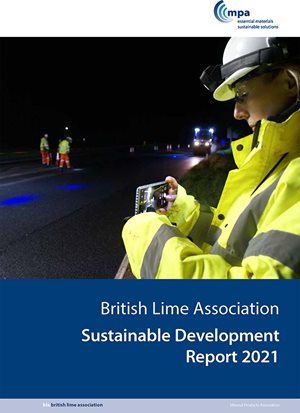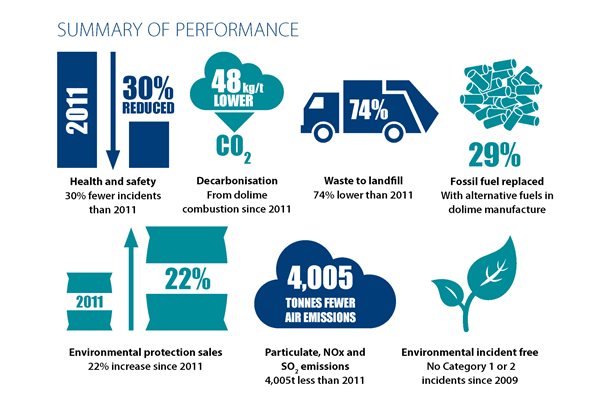 The past decade has seen a significant reduction in carbon emissions, waste and the use of fossil fuels in Britain’s essential lime sector.
The past decade has seen a significant reduction in carbon emissions, waste and the use of fossil fuels in Britain’s essential lime sector.
Those are just some of the highlights in the British Lime Association (BLA) Sustainable Development Report 2021 which sets out the sector’s performance during 2020 and emphasises the vital role lime plays in everyday life.
In a year of unprecedented challenges, production of lime had to continue to ensure safe drinking water, treatment of wastewater and the cleaning of emissions from incinerators, energy-from-waste plants and other large combustion processes. Lime is also critical for several core manufacturing industries including steel and plastics.
As with many sectors, the pandemic affected lime markets, particularly construction, and sales were lower in 2020, around 1.1 million tonnes. However, BLA Members maintained export markets during these difficult trading conditions and sales of lime for environmental protection remained strong, demonstrating the importance of lime to clean air, pure water and pollution prevention.
Commenting on the lime sector’s performance, Dr Rebecca Hooper, Director of the BLA said: “2020 highlighted how important the UK production of lime is to deliver the essential services we all rely on every day. The sector has helped strategic utilities continue to deliver pure water and cleaner air during one of the most difficult operating periods over the last eighteen months.
“We have also continued to address our sustainability objectives such as, researching hydrogen as a low carbon fuel, progressing projects to demonstrate the potential for hydrated lime to extend road life, as well as collaborating with academics to promote research and innovation.
“This year has also brought new economic challenges that lime manufacturers are struggling to address – an unfair UK Emissions Trading System that is specifically penalising UK lime manufacturers, complexity and costs associated with UK REACH registration, and now high energy prices. As a sector, we have demonstrated our importance to the nation, but now these new pressures are straining UK lime manufacturing and are making it difficult to keep operating costs within viable parameters and remain competitive.”
Reviewing progress over the past decade, the BLA 2021 Sustainable Development Report highlights:
- Health and safety - 30% fewer incidents than 2011.
- 48 kg/t lower CO2 – Decarbonisation from dolime combustion since 2011.
- Waste to landfill – 74% lower than 2011.
- 29% fossil fuel replaced with alternative fuels in dolime manufacture.
- Environmental protection sales - 22% increase since 2011.
- Particulate, NOx and SO2 emissions - 4,005 tonnes fewer than 2011.
- Environmental incident free - No Category 1 or 2 incidents.

Health and safety remained paramount throughout the pandemic and BLA Members adapted quickly to implement new hygiene practices required to safely continue production, whilst continuing to focus on good health and safety performance. BLA Members and Associate Members continued to work together during 2020, to share best practice, review incidents and drive towards the MPA Vision Zero objective.
The BLA Symposium showcasing UK research on lime planned for 2020 is now being held virtually on 13 October 2021. Making the most of the shift to online meetings has meant that the BLA was able to engage with a much wider range of academics than would have previously been possible, identifying new research and building new relationships that are enhancing the content of the upcoming, free-to-attend Symposium. More information is available on the BLA website: www.britishlime.org/news/Symposium2021.php
BLA Members appreciated the recognition and support from their local communities during the COVID-19 outbreak which has helped to continue delivering this essential and versatile material. Adapting to the new circumstances, BLA Members continued to engage with their communities, virtually when necessary.
Ends.
Note to Editors:
The BLA Sustainable Development Report can be found here.
About the Mineral Products Association:
The Mineral Products Association (MPA) is the trade association for the aggregates, asphalt, cement, concrete, dimension stone, lime, mortar and silica sand industries. With the merger of British Precast, and affiliation of the British Association of Reinforcement (BAR), Eurobitume, MPA Northern Ireland, MPA Scotland and the British Calcium Carbonate Federation, it has a growing membership of 520 companies and is the sectoral voice for mineral products. MPA membership is made up of the vast majority of independent SME quarrying companies throughout the UK, as well as the 9 major international and global companies. It covers 100% of UK cement and lime production, 90% of GB aggregates production, 95% of asphalt and over 70% of ready-mixed concrete and precast concrete production. In 2018, the industry supplied £16 billion worth of materials and services to the Economy. It is also the largest supplier to the construction industry, which had annual output valued at £172 billion in 2018. Industry production represents the largest materials flow in the UK economy and is also one of the largest manufacturing sectors.
www.mineralproducts.org.
For media enquiries, contact Elizabeth Clements at: Elizabeth.Clements@mineralproducts.org ; tel: 07775 894 285